The Roads We Take
By Mariam El-Khatib (story) & Sumayya (writing)
My father came to the States from Palestine at a young age to pursue his dream of playing soccer. Due to injuries, however, he gave up on the dream and started working for a humanitarian organization. After my sister and I were born, our parents decided to move back to Palestine to raise us closer to our roots. We lived there for a while until the organization my father worked for was shut down and he was forced to leave the country. And so we moved back to the States once again. Life had taught him early on that it owed nobody anything; that life was about more than living for oneself.
Growing up, my parents cemented the same lesson in my mind as we 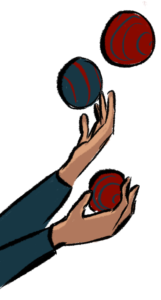
In high school, I didn’t think too much about the big career questions. I was good at my subjects and chose to focus on the present as I juggled my school, community, and family responsibilities. I knew that I loved maths and I figured that that kind of certainty would take care of itself. Sure enough, when the time came to pick a college to apply to it was a pretty straightforward decision for me. I liked math. Math = engineering and so I applied to the college of engineering at my state university.
But once I got into engineering college, I had to start thinking about declaring my major. I was the kind of person who wanted to try everything and anything. Picking one meant losing out on all the others. Come year end, I was still super indecisive about my major; it felt as though picking a major would decide my entire future.
Biomedical engineering, however, caught my attention. Biomed is involved in, in addition to other things, the making of prosthetic limbs. The more I learned about it, the more I began to see myself growing into it and so I picked it as my major. I started dreaming of a career where I helped provide prosthetic limbs to people affected by war and trauma. I wanted to give back to the people of my homeland and help them gain the mobility 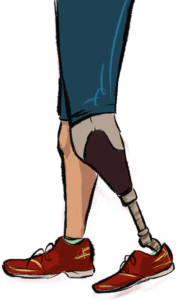
Around my third year, I started looking into research and internships. I got in touch with the PI of a lab that worked on prosthetic limbs (among other things) which seemed to have my name written on it. I was fortunate enough to land a research internship with the lab and worked with them for a year and a half. Here, I got to interact with a lot of different people, doctors, prosthetists, nurses, and patients. It was a very insightful experience.
As my third-year was coming to an end, I realized I needed a more work-oriented internship. So far my studies and internship had been very research-based and I knew that after graduation, research was not what I wanted to get into. It was time to look for something different. So when the career fair came around, I attended. Medical device companies are big in Minnesota as it happened, so I figured I’d apply to one at the fair.
But things don’t happen in the same way you figure they would. At the career fair, I was pulled aside by the stall of a big consulting company. The representatives at the stall were so personable and engaging, I ended up applying to their internship even though a consulting company was the last thing on my mind. I’d also applied to a medical device company and that seemed like the more likely choice.
After I got calls for a second interview from both companies and got to know both firms a bit better, I realized that the consulting firm was much better organized and had a more robust internship program. Unlikely as it was, I ended up doing a summer-long internship with the consulting company. It was my first glimpse into the corporate world and it was as enjoyable as it was educational.
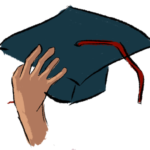
In the end, it came back to my values and my underlying motivation. While I wouldn’t be making prosthetics, there were other ways to give back to my community. And I could take some time to find them; life doesn’t always follow straight paths. I started at the firm soon after my graduation. The job was great, it was stable, the people I worked with were really nice and my family was happy for me. But I distinctly remember being in a meeting once and hearing something along the lines of,
“We’re a thirty-billion-dollar company. Our goal over the next five years is to be a sixty billion dollar one.”
That didn’t sit right with me. My work and effort had to be going towards more meaningful goals.
*
At the time, LaunchGood was a new small Muslim crowdfunding start-up. I’d been following their work online for a while and admired their brand. One day, I got one of those standard, newsletter-style emails from them telling me that Amany, a founding member of the firm, was coming to my state for an event. Being a fan of their work, I reached out.
Amany replied and we agreed to meet after the event. By the time Amany got to leave the event hall, it was pretty late so we ended up pulling into the first decent-looking cafe that was still open. Over dinner, we talked about everything from LaunchGood to books and podcasts. She told me about some of the inspiring programs they were working on – a world away from the dog stories I had to listen to at work!
Meeting Amany was great. At work, I’d listened to enough dog stories to write a book about dogs. Not to mention, I’d missed more ‘happy hours’ than I could count. While the people were great, it was strange to see how little people knew and were involved in beyond just their work and personal lives. Talking to Amany was refreshing. It reminded me of the beauty there is in pursuing one’s passion and working in a career that directly gave back to the community.
Some months later, I emailed Amany again asking her if I could volunteer with LaunchGood. She invited me to their upcoming Ramadan 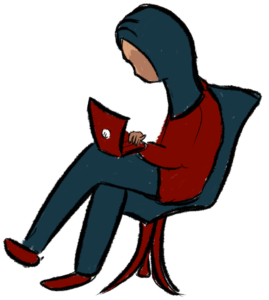
Ramadan arrived and it was showtime – Ramadan is a very, very busy time at LG. We were managing over a thousand campaigns and answering hundreds of tickets every day. I was speed learning everything on the go. The Fellowship was amazing, not only because of the actual work but it was also awesome to work with a Muslim team from all over the world. It was Ramadan, we were all fasting, sending each other encouraging messages, sharing reflections, duas, and, of course, working like crazies together. It was great!
*
When my Fellowship ended and it was time to go back to ‘work’, LaunchGood extended me a full-time offer. The offer had me conflicted. It had been awesome to work with them for a while but could I really quit my job to join a start-up?
While I certainly was the sort of person who liked to try new things, I was also one to settle in. Once I found my place, I liked to stay there. I had a nice place at the consulting firm; in fact, after the previous project, I was even promoted. Chris was honest with the offer, LaunGood was new – it could well collapse, the salary they could offer me was about half my current salary and there would not be nearly the same benefits as the ones I received from my other firm. And yet. The offer – the Muslim coworkers, the Quran reflections on our WhatsApp, the Eid pictures, the purpose of LaunchGood – it tugged at me.
So far in my life, my decisions took obvious routes. I liked maths, so I took engineering. While picking a major was tough, it was clearly a good option among many other good options. Research, internships, work – all lined up one after the other. But now I had an option that wasn’t in the same line of worldly ‘success’. I had an option to break the cycle of expectations in worldly gain.
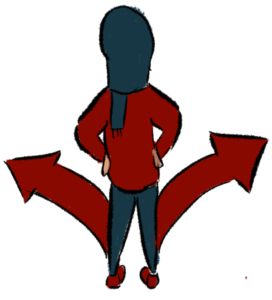
I talked it out with my family and convinced them that I was doing the right thing. They saw that I was excited about it and how I felt like it aligned with my values. They saw my passion coming through and trusted that it was going to be a good move for me.
Three years later and I wake up everyday feeling incredibly blessed for the job I have with LaunchGood. Nothing I do is related to my aspirations of being a prosthetist or my studies in Biomedical Engineering. It is a job that I didn’t know existed, let alone one I would have imagined holding. But it is a job that aligns with my values and allows me to give directly back to my community every single day – the very things I was raised on and ground me in everything I do.
*
I hope sharing my story will help those of you trying to figure out your paths into the seemingly daunting world of adulthood. What I’d like you to take away from my story, even if cliche, is that money doesn’t buy everything. Success in our society is defined in a ridgid way, but your success is defined on your terms. It doesn’t mean that success in dunya will not mean success in akhirah; it’s about which one tops your list of priorities. Don’t feel like you need to be defined by other people’s definitions. Your values are the most guiding factor. So don’t be afraid of change.
Copyright © 2021 Mariam El-Khatib & Sumayya
About the Authors
Mariam El-Khatib is a Palestinian-American born and raised in Minnesota. She graduated from the University of Minnesota with a degree in Biomedical Engineering and a minor in Neuroscience. Here, she was also involved in the student group Students for Justice in Palestine.
She currently works as a Product Manager for a Muslim crowdfunding company called LaunchGood. Outside of work, she serves as the chapter lead of American Muslims for Palestine and teaches Islamic Studies at Atawasul Weekend School. In her free time, Mariam likes to read and spend time with her family.
Links: Medium
Sumayya is a university student who wishes she had more time to read in a day.
Links: Twitter

